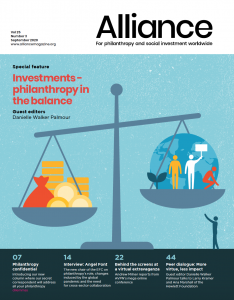What are the best investments for a foundation? This important question is one many foundation professionals are revisiting in light of low interest rates, high market volatility, and fears of deep economic trouble ahead. While stories of success certainly exist and are worth learning from, even the notorious lack of data cannot obscure the inconvenient truth that the idea of traditional endowments is in trouble.
I would argue that in order to unleash the potential of foundations, we should turn the question around, perhaps back on its feet: For which assets are foundations the best owners?
In the still dawning digital age, one fascinating answer may stare you right in the face as you read this. How much is your personal data worth? Your social media information, search and purchase history, they are the source of much of the market value of the fastest growing sector of our time. A rough estimate of market valuation of the major social platforms divided by their active users arrives at more than $1,000 USD per user, not differentiating by location or other factors. This sum is more than the median per capita wealth in about half the world’s countries. And if the trend continues, this value may continue to grow – and with it the big question of how to put one of the most valuable resource of our time to use for the good of all.
Acting as guardians of digital commons, data-endowed foundations could negotiate conditions for the commercial use of its assets, and invest the income to create equal digital opportunities, power 21st century education, and fight climate change.
Foundation ownership in the data sector may sound like a wild idea at first. Yet foundations and their predecessors have played the role of purpose-driven owners of critical assets and infrastructures throughout history. Monasteries (called ‘Stifte’ in German, the root of the German word for foundations) have protected knowledge and education in libraries, and secured health care in hospitals. Trusts have created affordable much of the social housing in the exploding cities of the 19th century. The German Marshall Plan created an endowment for economic recovery that is still in existence today.
The proposition is simple: Independent ownership for the good of all, beyond the commercial or national interests of individual corporations of governments, in perpetuity. Acting as guardians of digital commons, data-endowed foundations could negotiate conditions for the commercial use of its assets, and invest the income to create equal digital opportunities, power 21st century education, and fight climate change. An ideal model of ownership would also include a form of governance exercised by the users themselves through digital participation and elections. A foundation really only relies on one thing, a stable frame of rights in its legal home country. This is far from a trivial condition, but again history shows how many foundations have survived depressions, wars, and revolutions.
The idea does not start from zero. ICANN, the nonprofit governing the namespaces on the Internet, shows how independent control of key digital assets can work. Wikimedia Foundation, the organisation behind the largest collective work ever created, is governed by users. Much of the open source movement has put ownership of its code in places such as the Apache or Mozilla Foundations. And the IOTA developers have created an endowment that holds all digital tokens for autonomous machine transactions in the Internet-of-Things.
I have often heard it said that data is the oil of the 21st century. The comparison may be problematic, but perhaps there is still time for us to explore models of ownership that ensure that philanthropy is at the core of value creation rather than acting as one investor among many in financial markets that perpetuate many of the key social and environmental challenges. At the very least, data-based philanthropy could dwarf the foundations created by the old oil and steel empires.
Felix Oldenburg is the Chairman of DAFNE (Donors and Foundations Networks in Europe), as well as a member of the Alliance Publishing Trust board.
A previous article on this idea published in the German newspaper Handelsblatt can be found here.
 Subscribe today to receive our upcoming issue: Investments – philanthropy in the balance.
Subscribe today to receive our upcoming issue: Investments – philanthropy in the balance.
The philanthropic world is facing mounting challenges from the impacts of climate change to inequality, global pandemics and authoritarian populism increase. At the heart of sector debates is the question of how foundations use their resources: not just the small amount for grantmaking and other charitable spending but the totality – most of which is invested in global capital markets in sectors such as aviation and pharma, through vehicles such as hedge funds and private equity and managed by discrete investment houses, many of whom are unknown to philanthropy practitioners let alone the wider public.






Comments (1)
very interesting idea. How would one formalise that ownership? Currently by default, "owners" of data are the Facebooks and Googles. How would they relinquish their de facto control?